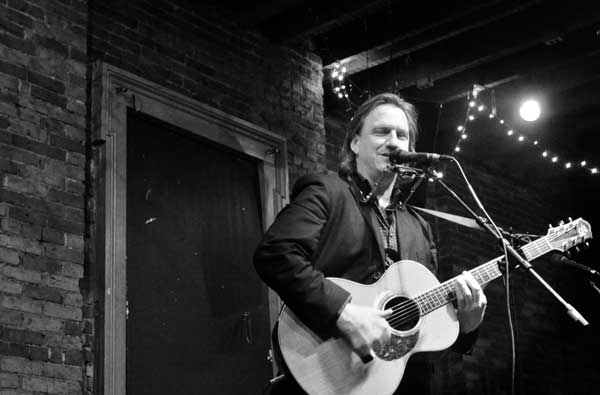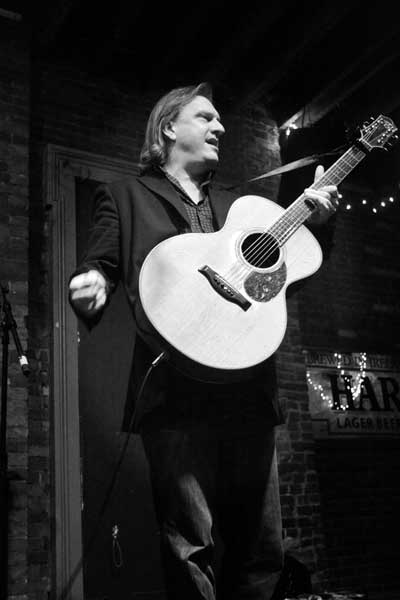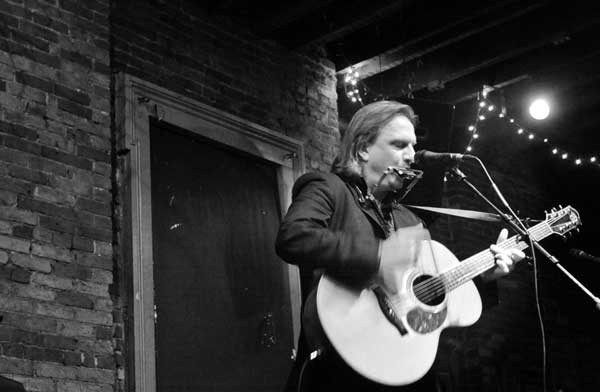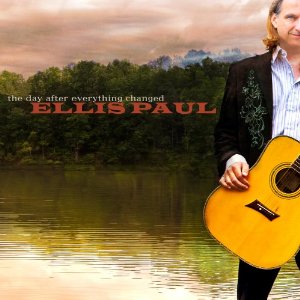Ellis Paul, performing at The Rudyard Kipling in Louisville last month: ‘I have kids, a family, and that paints my world view in a different way, too. And then I evolved, not just as a person but as a writer. I think the writing is more direct and more conversational.’Getting To The Point, Without Detours
On his new album, The Day After Everything Changed, Ellis Paul reaffirms his standing as one of our finest singer-songwriters with his most striking explorations of the heart’s deepest stirrings, and our collective resiliency in the face of hard times all around
By David McGee
Photographs by Audrey HarrodIt’s not unusual anymore for artists to be the beneficiaries of more than mere good word of mouth advertising from their fan base. Stories abound of fans opening up their pocketbooks to help support their favorite artists’ efforts at every level, whether it’s Prince and Trent Reznor selling eye popping numbers of self-released albums outside the major label apparatus that once sustained them, or new and developing artists touring behind their fans’ financial benevolence. With his deeply moving new album, The Day Everything Changed, the much-honored, socially conscious singer-songwriter Ellis Paul has joined the ranks of artists tapping into this new realm of financial wherewithal.
Maybe absence truly makes the heart grow fonder.
It’s been five years since this standard bearer for the highly regarded Boston folk scene released an album’s worth of new songs that weren’t specifically aimed at children and families (that was 2008’s The Dragonfly Races; granted, how it differed from the typical Ellis Paul album was a matter of degrees, but it had a specific aim). When he had the songs together for The Day…, Paul and his long-time manager Ralph Jaccodine had to decide whether to re-up with Rounder, Paul’s home since 1995, or go the DIY route on their own Black Wolf label, which has released five Ellis Paul albums starting with 1993’s Say Something. Opting for the Black Wolf route, Paul got the word out to his fans, and offered different levels of contribution, with the premiums for each enhanced with the size of the donation—“everything from a written hand page of lyrics to a free guitar, free house concerts, lifetime passes to concerts, things like that,” Paul said in a phone interview from the road, en route to the next date to bring the songs of The Day… to a new audience.
It worked—worked to the tune of $100,000 raised, enough to cover all the record and promotion expenses, more budget than he had ever been given to make an album, in fact. Only now, he said in early March, was he starting to dip into his own pocket to cover additional promotion.
“I really wanted to make sure that we gave them back something that they were going to be proud of being involved in,” Paul said, “especially in light of the fact that if I ever have to do it again, I’m hoping they’ll jump back on it.”
‘You want the listeners to be kind of like co-writers. As they’re listening they’re applying characters from their own life to the characters in the songs, and creating new images based on their experiences.’That should be no problem, because The Day After Everything Changed is providing a bountiful Return On Investment for those who bought stock in it, as it brings together all of Paul’s strengths as a writer (10 of the 15 tracks were solely written by Paul, with the other five being co-writes with his buddy Kristian Bush of Sugarland)—moving character studies of people in relationships (especially troubled ones) and unflinching topical commentary on how various political and economic calamities in this country have affected and afflicted ordinary citizens. On his website bio, Paul writes that “there are differences between me now and the me I was in the early ‘90s.” Asked to explain who “me now” is, he points out how being in his mid-40s has changed his point of view: “When I’m writing about being young, I’m doing it from a distance.
“Then there’s the fact that I have kids, a family, and that paints my world view in a different way, too,” he adds. “And then I evolved, not just as a person but as a writer. I think the writing is more direct and more conversational.
“Less word-heavy,” he notes with a laugh. “I try to get to the point more directly than I used to.“
And then there is this: “As far as the personal relationship stuff, I’ve been going through a separation with my current wife, and I think that has a lot to do with some of the perspectives on the record.”
Which may explain why on The Day After Everything Changed Paul is more concerned with one-on-one politics, the games people play, the damage couples inflict on each other and how the partners recover from it while finding their ways apart. The terse piano-based ballad “Hurricane Angel,” though, is the moment when Paul turns an angry eye on our current economic and political malaise, using the aftermath of Hurricane Katrina to lay out a specific indictment of a world gone completely haywire, and few of the major culprits escape being name-checked for being complicit in the horror: the President (we automatically assume it’s Bush, but in fact Obama has visited New Orleans fewer times than did his predecessor), Exxon (a stand-in for all oil companies), banks that have jacked up credit card rates and farmed out their customer service to India (“There’s a man in India wondering where the money went/But I can’t pay”), health insurance providers and their faceless bureaucrat foot soldiers in Delaware. Paul’s character is one of those forgotten thousands left abandoned in a trailer “with sixteen refugees,” but behind his gritty voice the music—a blend of piano, organ, trumpet and trombone—ascends with a gentle, vaulting spirituality, and Paul beseeches the angels for a healing sign, even says to the Almighty, “Lord, Lord, Lord we haven’t spoken in many a day” (as if to say, Why has thou forsaken me?), and in the midst of the turmoil suggests, however ambiguously, the triumph of the soul we’ve seen down there: “Hurricane Angel/I’m lifting my eyes over Baton Rouge/Lift up your wings/Let me hear your voice singing/Can you turn these/Black skies to blue again?” It’s a dominant, haunting moment, one of the most powerful songs anyone’s offered yet as a precise summation of how deep into the mire our nation has fallen.
‘There are a lot of heavy songs on the record, and I needed to find a way to balance the listener’s ears so they went through a bit of a journey with all of the moods. Maybe in that sense there was a story happening.’Again, though, Paul has other things on his mind as a songwriter here. The result is, arguably, his most striking explorations yet of the heart’s deepest stirrings, for better or ill. The album kicks off with a rousing, soaring celebration of a different kind of angel he looks for in New Orleans—in “Annalee” the object of his affection emerges from a skinny dipping dive at river’s edge and leaves Paul gasping at what he regards as a Heaven-sent vision. Over a jittery, country-inflected backdrop, Paul cuts loose vocally, and though his exuberance suggests salvation, a quintessential Ellis Paul finale articulates the, shall we say, fierce urgency of now: “What tomorrow brings God only knows/I know this about tomorrow/We’re filling it with sorrow/If we let it tonight just end.” Paul never really bets on the higher power—not even in “Hurricane Angel” does he do that—but he’s on intimate terms with his own heart. That same urgency, framed in topicality, informs the next song, the graceful, lilting “Rose Tattoo,” which may well be a later chapter of the story begun in “Annalee.” Here, though, the couple is married, struggling, with one baby and another on the way, engulfed in debt, shopping for essentials (including clothing) at Walmart, but even though “the economy’s crashin’,” and problems thus mounting incrementally, they “put Van Morrison on the stereo” and lean on their love for each other as a bulwark against all outside assaults on their union. Paul’s warm croon, and the soothing melody and harmonium underpinning, exude optimism and fortitude—and who but Ellis Paul could observe, ”Sure there’s trouble in the boardrooms/Trouble in the factories/Trouble in the alley out back,” and then declare, “But we’ve got love in these patterns”? Who else would put it quite like that?
As easy as it is to hear a conceptual narrative developing as the songs roll on, Paul views such an interpretation as being more in the ear of the listener than reflecting his intent. In sequencing the album his aim was “to balance the dark and light of the moods, and you’re also working with the time signatures of each song. There are a lot of heavy songs on the record, and I needed to find a way to balance the listener’s ears so they went through a bit of a journey with all of the moods. Maybe in that sense there was a story happening. So we started with the more uplifting songs, brought them in casually, then started to filter in some of the darker songs as it went on. So there was a bit of a journey being created, but not like a literal, let’s-start-from-the-beginning literal journey. It was more of a tone and a mood thing.”
At the same, Paul welcomes fans taking the new album on very personal terms. “That’s what you want. You want them to be kind of like a co-writer. As they’re listening they’re applying characters from their own life to the characters in the songs, and creating new images based on their experiences.”
In recent years Paul’s focus has turned increasingly to populist issues, which has found him variously participating in a Woody Guthrie tribute tour, setting unpublished Guthrie lyrics to music (“God’s Promise”), even being named an honorary citizen of Guthrie’s birthplace, Okemah, Oklahoma. Let’s say Woody would be proud of what he hears from Paul on the new long player. “Hurricane Angel” is the most dramatic of these songs, in that it uses Katrina as its center and dutifully checks off pretty much all the other social calamities that have ensued since New Orleans was almost wiped off the map. The title sentiment, “Hurricane Angel,” suggesting a benevolent spirit riding in with the hurricane, is certainly a different way of approaching the situation, and a quintessential example of Paul’s spiritually based optimism in song. But it’s a benediction here, after the horrors have been catalogued, dramatically so; as he explains the song's genesis, his own words reveal its roots in a personal crisis that allowed him to see it all in a different light.
“The main thing that hit me about Katrina was that a few years after the fact all these people living in FEMA trailers were kicked out because they were being poisoned by formaldehyde inside the trailer walls,” he explained. “About 40,000 people who had lived in them were getting sick, and had to be kicked out. I don’t even know where they are now, those 40,000 people. I was just driving around feeling sorry for myself; I was having a tough period financially, credit card bills were late, it was impossible to pay rent, and I was driving around and heard this story about these people, and it was one of those moments when you realize your troubles are only relative to the bigger picture. Suddenly my troubles weren’t so big. So I ended up applying a lot of the things I was going to onto one of the Katrina victims. They’re looking for help from insurance companies and credit card companies, and those people are all probably wiped out financially, probably a lot of them lost their jobs, their homes and their ability to pay for things. So that was my access point, but I did bring up all the other things that people are going through consistently, first with insurance, because it’s so hard to pay for yourself at times.”
Ellis Paul, ‘Rose Tattoo,’ from The Day After Everything Changed, with Antje Duvekot at the Ferry Building in San Francisco, August 26, 2009His favorite of these songs, he admits, is “Rose Tattoo,” in which the husband has been laid off, leading to he and his wife’s world starting to fall apart under the weight of the country’s economic calamity, yet they find strength in their love to fight through it all, cuddling up to Van Morrison as they await the challenge of a new day. Paul points out that the story could be worse, but its action occurs on “the first day of a person being laid off, so there’s a little more optimism then than there is on the hundredth. I caught ‘em at a good time. Wait ‘til the next record! I think the real safety net that binds people is their relationships with each other. So, in times of trouble you circle the wagons. That song has become my favorite from the record over time.”
It may take a couple of listens to figure out how a song set in the Civil War, “The Cotton’s Burning,” fits with other songs set in contemporary America, but it does. Its narrator is a Confederate soldier who wants more than anything for the dying and destruction to end, so he can return to his wife and to his farm, building cradles instead of coffins, engaged in life rather than death. The character’s strength and optimism in the face of tragedy, his determination to make something good in its aftermath, is no different than that of the couple in “Rose Tattoo” or the survivors in “Hurricane Angel.”
Actually, in “The Cotton’s Burning” can be found much of the character of Ellis Paul’s artistic sensibility, an answer to why he’s writing about the struggles of working people. It’s not about an urban folkie’s embrace of Woody Guthrie simply as basic repertoire. The artist born Paul Plissey in Fort Kent, Maine, on January 14, 1965, grew up in a rural, potato farming community; his father, Ed, was executive director of the Maine Potato Commission, his grandfather a potato farmer with a 140-acre spread that Paul worked as a youngster. In the community proper, schools closed for three weeks each year so the kids could assist in the potato harvest. His mother, Marilyn, was an extension agent for northern Aroostock County, and in the ‘60s produced her own TV show, The Aroostock Homemaker, on WAGM-TV. Paul became a track star in high school (he was the Maine state champion in 5K distance running) and earned an athletic scholarship to Boston College. Pretty much a Top 40 and big band jazz fan to that point, at BC he was introduced to the songs of Bob Dylan and started seriously exploring folk music, which led him, inevitably, to Woody Guthrie and a greater purpose he has never abandoned.
After a knee injury ended his track career, he taught himself guitar and almost immediately began writing original songs—“pretty horrendous to begin with,” as he told writer Arthur Woods in 1996, “but they kept getting better and better.” After graduating he worked for a time as a teacher and social worker, but in 1992 decided to give music his full-time efforts. After meeting Ralph Jaccodine and founding Black Wolf Records, Paul released his first albums of original material, Am I Home and Urban Folksongs, in 1989. As he amped up his personal appearances and gained greater attention in the Boston area and in folk circles nationally, awards started accumulating: a Boston Acoustic Underground award in ’91 and the next year, the 1st Boston Music Award for Outstanding New Folk/Acoustic Act—the first of 14 Boston Music Awards he has earned, with the latest coming last year, for Folk Act of the Year, which followed by one year a Parents’ Choice Foundation Award for The Dragonfly Races.
Ellis Paul, ‘Lights of Vegas,’ at Cleveland’s Beachland Tavern, September 17, 2009But it took his recent relocation from Boston to the heart of the south, Charlottsville, Virginia, to bring “The Cotton’s Burning” to life.
“I finally found myself living in the battle zones of Virginia, so I’m confronted with it more on a daily basis. I was reading something about the night Richmond fell. It was handed over to the Union soldiers and the Confederates basically lit the city on fire, went into all the distilleries, opened all the whiskey vats and whiskey was running in the streets. It created this crazy party atmosphere because the prisoners were all released and people were roaming the streets, literally putting their cups into the road and drinking whiskey off the street. So there’s all this chaos around it, and that was the entry point for the song, with the character again being at some kind of crossroads where he’s trying to make changes in his life. All the characters are somewhat reflective, looking for change and how to make change. So I kind of felt like he was just on a long journey and I’m trying to explain it to people, from the beginning of the war to the end of the war and where he’s at. After working with death for so long, now he wants to work with life, as the line at the says, about building cradles instead of coffins.”
There is much on the album that is deadly serious, but it’s not like Paul doesn’t have some fun along the way. “Dragonfly,” with its delicate, fingerpicked guitar and lovely, understated accordion, is a tidy, wonder-filled exultation of love remembered, maybe even recovered, its mystery remaining. The one out-and-out cover is clever indeed: a pairing of Patsy Cline’s first hit, “Walkin’ After Midnight,” with Sam Baker’s “Change,” that doesn’t attempt to occupy any ground claimed by each song’s original practitioners, but instead rocks steadily onward, fueled by a stinging slide guitar, pounding drums, a robust trumpet/trombone horn section and keyboards. The medley was a spur-of-the-moment inspiration at a New Year’s show in Boston, when Baker was in attendance. Paul’s band played the Cline chestnut in “a driving, bluegrassy kind of arrangement” suitable for a crowd in full year-end celebration mode, then, as a thank-you to Baker, who had opened some shows for Paul, the musicians broke into “Change.” In doing both songs uptempo, back to back, Paul sensed a different take on the story.
“Each song colors the other song—‘Change’ talks about people coming back from war, so it’s topical and ‘Walkin’ After Midnight’ is someone reminiscing about a relationship that’s gone; they’re going out for a walk hoping they’ll bump into someone they used to have interludes with. I hope people don’t think it’s too wacky. We took the melancholy out, put some optimism in. I think the guy is actually not doubting that the other person is going to show up this time. It feels like the walking is going to create something that’s really going to happen rather than remorse or whatever she was feeling in the original.”
Ellis Paul, title track of The Day After EverythingChanged, at the Boston Rock and Blues Cruise, August 14, 2009, with the Adam Ezra Group backing him. This video montage of the event was posted at YouTube by lionessrk17.Not least of all is the rocking “River Road,” one of the co-writes with Kristian Bush, which co-opts the “trade in these wings on some wheels” lyric from Springsteen’s “Thunder Road” in a fleeting reference about halfway through. Turns out Bush sneaked it by Paul. “I I had brought the song in pretty much done, but I didn’t like the chorus because it was too reminiscent of another song. It had a line about taking the wheel, but Carrie Underwood had just put out a song with one line that was almost the same. So Kristian helped me rewrite the chorus, but he threw in [the Springsteen] line, and I didn’t pick up that it was from ‘Thunder Road’ until very recently. That’s exactly what I was trying to avoid, then he slipped it in on me and didn’t tell me it was happening. I thought he had completely invented that line himself, and I was like, ‘Man, that’s why I like writing with you—you just come up with these great lines!’ I’m a big Springsteen fan, but I never picked up on that line.”
No one’s going to begrude Paul the use of a Bruce lyric anyway. He proved his mettle as a writer a long time ago. And based on audience reaction to the early shows of the tour promoting The Day After Everything Changed, audiences are a lot more focused on, well, everything but where that “wings for wheels” lyric came from. “A lot of people are singing along,” he reports of the crowd’s reaction to the new material. “I’m doing a lot more interaction with the crowd and it’s creating really great moments during the shows. Right across the board people are telling me how much they like the album and think it’s the best thing I’ve ever done.
“And I think it’s the best thing I’ve ever done, so it’s gratifying.”
The Day After Everything Changed is available at www.amazon.com
Founder/Publisher/Editor: David McGee
Contributing Editors: Billy Altman, Laura Fissinger, Christopher Hill, Derk Richardson
Logo Design: John Mendelsohn (www.johnmendelsohn.com)
Website Design: Kieran McGee (www.kieranmcgee.com)
Staff Photographers: Audrey Harrod (Louisville, KY; www.flickr.com/audreyharrod), Alicia Zappier (New York)
E-mail: thebluegrassspecial@gmail.com
Mailing Address: David McGee, 201 W. 85 St.—5B, New York, NY 10024






